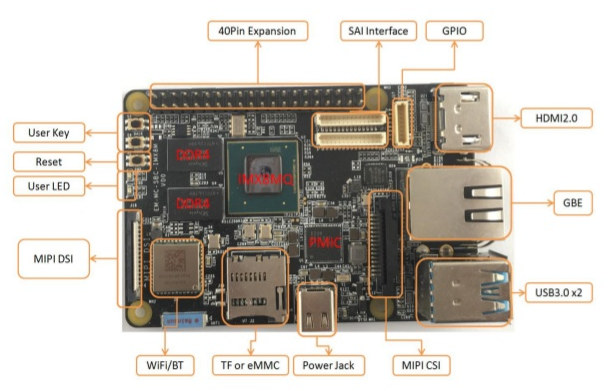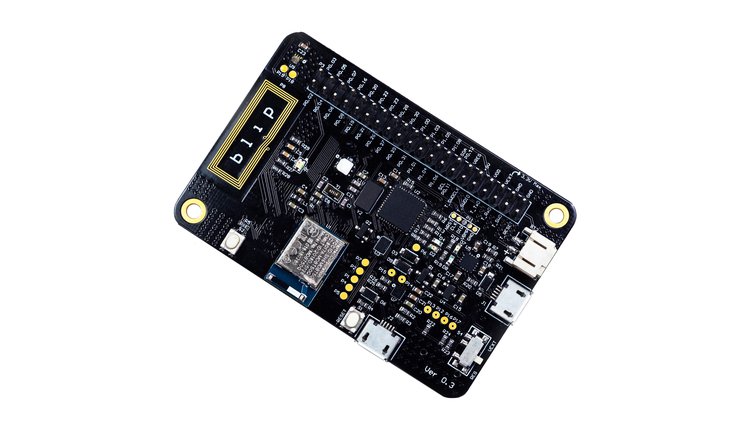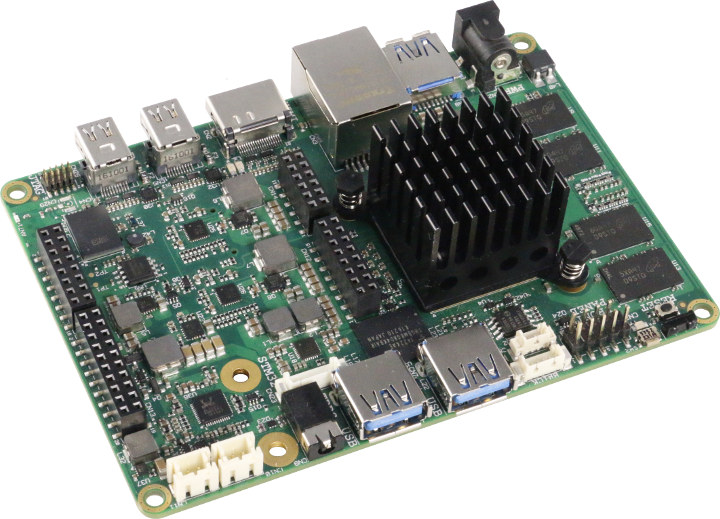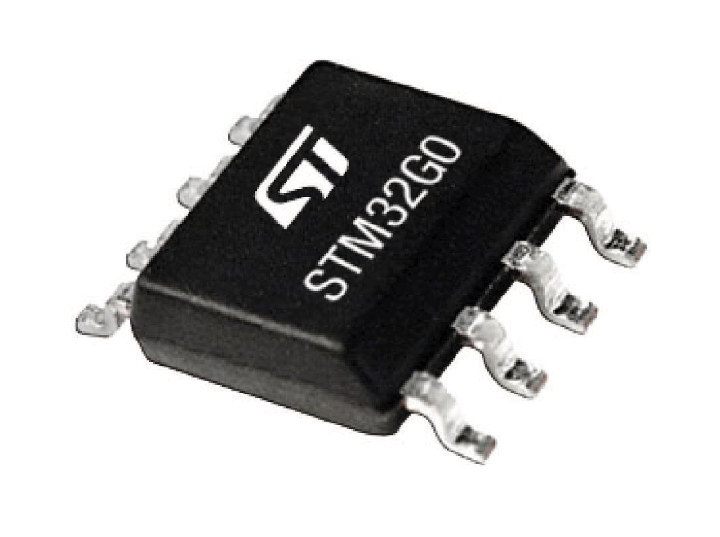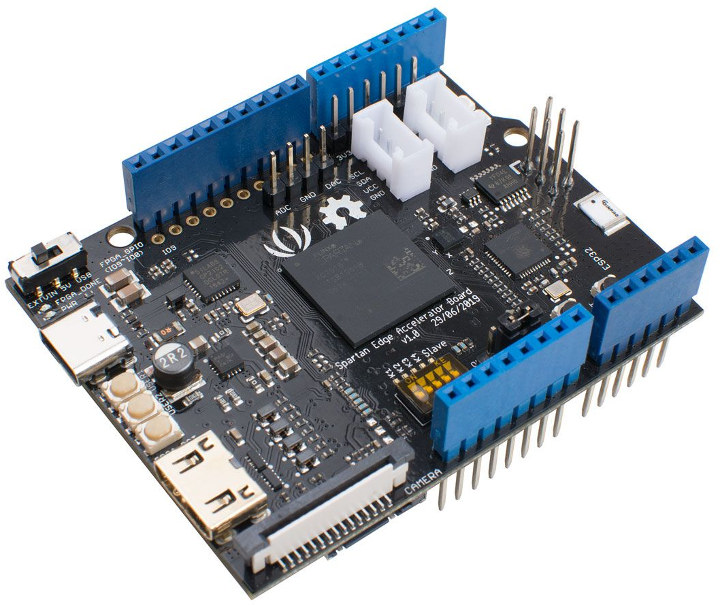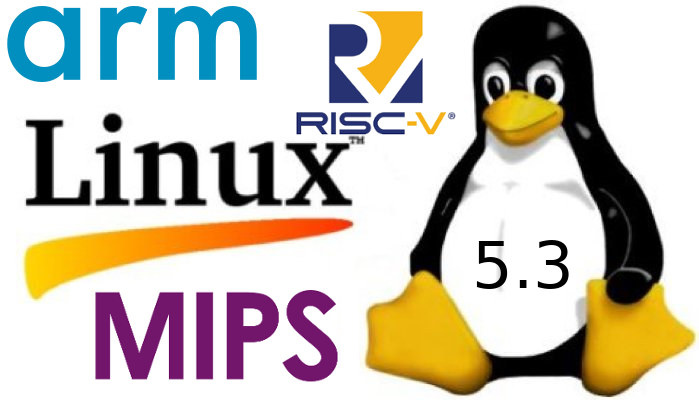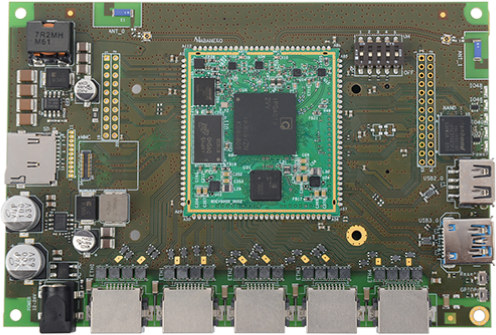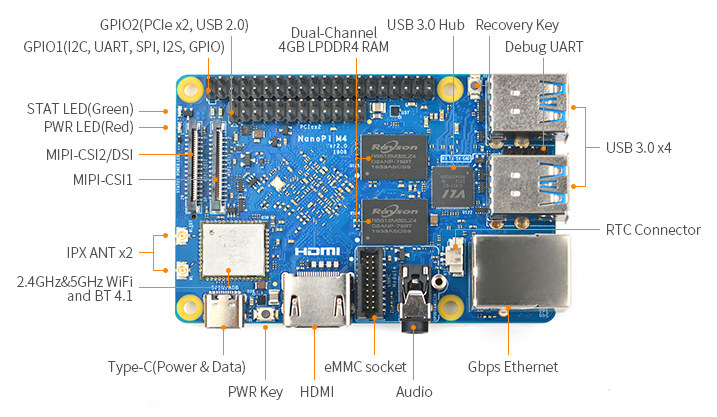When we looked for information about PICO-PI-IMX8M single board computer, we noticed another Raspberry Pi shaped board powered by NXP i.MX 8M processor: MaaXBoard by Embest, an AVNET company. The board comes with up to 4 GB DDR4 RAM, a MicroSD card slot or eMMC flash for storage, Gigabit Ethernet, WiFi & Bluetooth, HDMI 2.0, USB 3.0 port, MIPI CSI & DSI ports, and of course a the 40-pin “Raspberry Pi” expansion header. MaaxBoard specifications: SoC – NXP i.MX 8MQ quad-core Arm Cortex-A53 processor, Cortex-M4F real-time core, and Vivante GPU with OpenGL/ES 3.1, OpenGL 3.0, Vulkan, OpenCL 1.2 System Memory – 2GB DDR4 SDRAM (up to 4GB) Storage – MicroSD card slot or optional eMMC flash up to 64GB Video Output – HDMI 2.0 up to 4K @ 60 Hz, MIPI DSI display connector Video Playback – 4Kp60 with High Dynamic Range (H.265, VP9), 4Kp30 (H.264), 1080p60 (MPEG2, MPEG4p2, VC1, […]
Blip Nordic nRF52840 Dev Board Includes STM32 Black Magic Probe Programmer & Debugger (Crowdfunding)
The Latest Electronut Labs Nordic nRF52840 Based Dev Board Electronut Labs has started its Crowd Supply campaign for Blip, a Nordic nRF52840 based development board. With many onboard sensors and systems, the boards are aimed at prototyping and projects in a wide variety of BLE and 802.15.4, wireless application scenarios. It has a programmer and debugger built-in. Past Articles Electronut Labs has a series of Nordic Semiconductor SoC projects previously reported on including Papyr, a Bluetooth E-Paper Display and Bluey, a BLE Development board using the Nordic nRF52832, and CNXSoft also published an article comparing several of the Nordic SoC available in development boards for Bluetooth 5 (BLE5). The Features the Stand Out Blip has a Black magic Probe compatible programmer and debugger built-in, along with a temperature/humidity sensor, ambient light intensity sensor, and a three-axis accelerometer. The board is designed to prototype very low power devices and an ability […]
UDOO X86 II SBC Combines Intel Braswell SoC with Microchip ATMega32U4 “Arduino” MCU
UDOO X86 development board was first introduced in a crowdfunding campaign in 2016 with a quad-core Intel Braswell processor coupled with an Arduino 101 compatible Intel Curie module for real-time I/O processing. Early July of next year (2019) the Intel processor and module seems to be going so well and have a bright future together with UDOO X86 board and accessories becoming broadly available. But life can be cruel at times, and Intel announced their plan to discontinue Intel Curie and other IoT projects just a few weeks later with the last shipment scheduled for July 2018. SECO, the company behind UDOO, could only order so much stock of Intel Curie module, so they had to design an alternative, and here we are with UDOO X86 II SBC offering many of the same features but replacing Intel Curie module by a Microchip ATmega32U4 MCU compatible with Arduino Leonardo. Two […]
STMicro Launches the first 8-pin STM32 Microcontrollers
At the end of last year, STMicro introduced what they claim is the first 90nm mainstream microcontroller with STM32G0 Arm Cortex-M0+ MCU clocked at 64 MHz. At the time, the family included parts with 24, 32, 48 and 64 pins packages, but there were also plans for 8-pin and 100-pin STM32G0 microcontrollers. The company has now just announced availability for the first 8-pin STM32 microcontrollers thanks to four new STM32G0 SKUs with up to 8KB RAM and 32KB flash in an SO8N package. The 90nm process node and simpler design make the new microcontrollers most suitable for cost & energy-conscious applications governed by battery-capacity limits, eco-design legislation, or market expectations such as appliance energy ratings. 8-pin STM32 Microcontrollers Available Now STM32G030J6 is part of STM32G0 Value Line with 32KB flash and 8KB memory, as well as 6 I/O pins supporting GPIO, SPI, I2C, and UART outputs. STM32G031J6, STM32G031J4, and STM32G041J6 […]
Spartan Edge Accelerator Arduino Compatible Board Combines ESP32 & Spartan-7 FPGA
Xilinx Spartan FPGAs have been around for a while, and a few years ago we covered Spartan-6 FPGA boards such as Spartixed and miniSpartan6+. Seeed Studio has now launched another Xilinx Spartan board with WiFi and Bluetooth connectivity. Spartan Edge Accelerator Board follows Arduino UNO form factor and combines a more recent Xilinx Spartan-7 FPGA with Espressif Systems ESP32 WiFi + Bluetooth chip. Spartan Edge Accelerator specifications: FPGA – Xilinx Spartan-7 XC7S15 FPGA with 12.8K Logic Cells and 360Kb block RAM WiSoC – Espressif Systems ESP32 SoC with 802.11 b/g/n 2.4GHz WiFi and Bluetooth 4.1 BLE Storage – SPI flash, MicroSD card slot Video Output – Mini HDMI Video Input – CSI Camera Interface with support for OV5640 sensor USB – USB type-C port Expansion Arduino UNO headers (5V) FPGA I/O header DAC output and ADC input header (via 8-bit ADC1173 chip) 2x Grove connectors (I2C and digital I/O) Debugging […]
Linux 5.3 Release – Main Changes, Arm, MIPS & RISC-V Architectures
Linus Torvalds has just announced the release of Linux 5.3: So we’ve had a fairly quiet last week, but I think it was good that we ended up having that extra week and the final rc8. Even if the reason for that extra week was my travel schedule rather than any pending issues, we ended up having a few good fixes come in, including some for some bad btrfs behavior. Yeah, there’s some unnecessary noise in there too (like the speling fixes), but we also had several last-minute reverts for things that caused issues. One _particularly_ last-minute revert is the top-most commit (ignoring the version change itself) done just before the release, and while it’s very annoying, it’s perhaps also instructive. What’s instructive about it is that I reverted a commit that wasn’t actually buggy. In fact, it was doing exactly what it set out to do, and did it […]
Habanero Qualcomm IPQ4019/IPQ4029 SoM Brings 802.11ac Wave2 WiFi to Linux Gateways and Routers
Last April, we first wrote about Qualcomm IPQ4019 quad-core Cortex-A7 processor with built-in 802.11ac Wave 2 WiFi, as it was found in Qualcomm Mesh Networking DevKit with support for Amazon Alexa. A few months later, we discovered router boards powered by either IPQ4019 or IPQ4029 processor such as Dakota DR40X9 or MikroTik RB450Gx4. The latter does not come with WiFi at all and instead leverages the hardware IPSec encryption built-into the processor. Habanero System-on-Module Today, we’ve come across the first IPQ4019 / IPQ4029 system-on-module we’ve countered so far, courtesy of 8devices with their Habanero and Habanero-I 802.11ac Wave 2 modules based on the respective processors. Habanero(-I) specifications: SoC – Qualcomm IPQ4019/IPQ4029 quad-core Arm Cortex-A7 processor @ 717 MHz with NEON, FPU, hardware-based NAT engine, and crypto accelerator System Memory – 512 MB DDR3L RAM Storage – 32MB NOR flash; up to 1 GB NAND flash on baseboard Connectivity QCA8075C 5-port […]
$70 NanoPi M4V2 SBC Gets 4GB LPDDR4 RAM, Power & Recovery Buttons
FriendlyELEC NanoPi M4 is a Rockchip RK3399 single board computer that follows Raspberry Pi 3 form factor, and was launched in a year ago for $65 with 2GB RAM, and $95 with 4GB RAM. Raspberry Pi 4 introduction brought some more competition, and helped the prices drop to $50 and $75 respectively. But now the company has launched a revision 2 of the board, NanoPi M4V2 that replaces LPDDR3 memory with faster LPDDR4 memory, adds power & recovery buttons, and the audio jack now also support microphone input. It’s only available with 4GB LPDDR4 memory, and the price is lower at $70. The rest of the specifications are mostly identical: SoC – Rockchip RK3399 big.LITTLE hexa-core processor with 2x Arm Cortex-A72 @ up to 2.0GHz, 4x Cortex-A53 @ up to 1.5GHz, a Mali-T864 GPU with support OpenGL ES1.1/2.0/3.0/3.1, OpenVG1.1, OpenCL, DX11, and AFBC, and a VPU with 4K VP9 and […]


